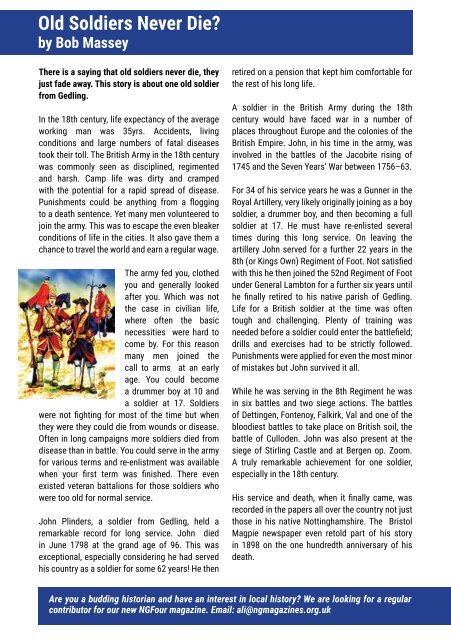NGFour Sept/Oct 2020
Local business directory and community magazine
Local business directory and community magazine
Create successful ePaper yourself
Turn your PDF publications into a flip-book with our unique Google optimized e-Paper software.
Old Soldiers Never Die?<br />
by Bob Massey<br />
There is a saying that old soldiers never die, they<br />
just fade away. This story is about one old soldier<br />
from Gedling.<br />
In the 18th century, life expectancy of the average<br />
working man was 35yrs. Accidents, living<br />
conditions and large numbers of fatal diseases<br />
took their toll. The British Army in the 18th century<br />
was commonly seen as disciplined, regimented<br />
and harsh. Camp life was dirty and cramped<br />
with the potential for a rapid spread of disease.<br />
Punishments could be anything from a flogging<br />
to a death sentence. Yet many men volunteered to<br />
join the army. This was to escape the even bleaker<br />
conditions of life in the cities. It also gave them a<br />
chance to travel the world and earn a regular wage.<br />
The army fed you, clothed<br />
you and generally looked<br />
after you. Which was not<br />
the case in civilian life,<br />
where often the basic<br />
necessities were hard to<br />
come by. For this reason<br />
many men joined the<br />
call to arms at an early<br />
age. You could become<br />
a drummer boy at 10 and<br />
a soldier at 17. Soldiers<br />
were not fighting for most of the time but when<br />
they were they could die from wounds or disease.<br />
Often in long campaigns more soldiers died from<br />
disease than in battle. You could serve in the army<br />
for various terms and re-enlistment was available<br />
when your first term was finished. There even<br />
existed veteran battalions for those soldiers who<br />
were too old for normal service.<br />
John Plinders, a soldier from Gedling, held a<br />
remarkable record for long service. John died<br />
in June 1798 at the grand age of 96. This was<br />
exceptional, especially considering he had served<br />
his country as a soldier for some 62 years! He then<br />
retired on a pension that kept him comfortable for<br />
the rest of his long life.<br />
A soldier in the British Army during the 18th<br />
century would have faced war in a number of<br />
places throughout Europe and the colonies of the<br />
British Empire. John, in his time in the army, was<br />
involved in the battles of the Jacobite rising of<br />
1745 and the Seven Years’ War between 1756–63.<br />
For 34 of his service years he was a Gunner in the<br />
Royal Artillery, very likely originally joining as a boy<br />
soldier, a drummer boy, and then becoming a full<br />
soldier at 17. He must have re-enlisted several<br />
times during this long service. On leaving the<br />
artillery John served for a further 22 years in the<br />
8th (or Kings Own) Regiment of Foot. Not satisfied<br />
with this he then joined the 52nd Regiment of Foot<br />
under General Lambton for a further six years until<br />
he finally retired to his native parish of Gedling.<br />
Life for a British soldier at the time was often<br />
tough and challenging. Plenty of training was<br />
needed before a soldier could enter the battlefield;<br />
drills and exercises had to be strictly followed.<br />
Punishments were applied for even the most minor<br />
of mistakes but John survived it all.<br />
While he was serving in the 8th Regiment he was<br />
in six battles and two siege actions. The battles<br />
of Dettingen, Fontenoy, Falkirk, Val and one of the<br />
bloodiest battles to take place on British soil, the<br />
battle of Culloden. John was also present at the<br />
siege of Stirling Castle and at Bergen op. Zoom.<br />
A truly remarkable achievement for one soldier,<br />
especially in the 18th century.<br />
His service and death, when it finally came, was<br />
recorded in the papers all over the country not just<br />
those in his native Nottinghamshire. The Bristol<br />
Magpie newspaper even retold part of his story<br />
in 1898 on the one hundredth anniversary of his<br />
death.<br />
Are you a budding historian and have an interest in local history? We are looking for a regular<br />
contributor for our new <strong>NGFour</strong> magazine. Email: ali@ngmagazines.org.uk


















